Photographs: Rajesh Karkera/Rediff.com
Lieutenant General K T Parnaik, the third highest ranking officer in the Indian Army, is responsible for guarding 1,896 kilometres of India's border with Pakistan and China.
He spoke to Rediff.com in an exclusive and fascinating interview.
"The satisfaction of having done something for the country is so long lasting that it will stay forever," says Lieutenant General Kaiwalya Trivikram Parnaik, who may be the third highest ranking officer in the Indian Army, but is the man responsible for guarding the most critical of India's borders.
The soft-spoken, slightly built, general with a handlebar moustache, heads the Indian Army's most strategic command in the sensitive state of Jammu and Kashmir -- including the Siachen Glacier.
The Northern Command is responsible for guarding 1,896 kilometres of India's border with Pakistan and China.
Referred to as the 'Army Commander,' General Parnaik has served the Indian Army for 40 years -- a distinguished military career which has included commanding an infantry brigade on the Line of Control; a mountain division in Sikkim; and a corps in Assam for which he won the Uttam Yudh Seva Medal for gallantry.
In his office at the Northern Command headquarters in Udhampur, Jammu and Kashmir, General Parnaik spoke to Rediff.com's Archana Masih in a rare and exclusive interview.
"We have been fighting insurgency for 20, 30 years, but never used a heavy weapon, tanks, aircraft or artillery against our people. That speaks volumes of the efforts of the Indian armed forces. Today, Western countries are learning from us," he says in a wide-ranging interview with valuable insights on how soldiering has changed in present times, the incidents of impropriety in the armed forces, the Chinese factor in Pakistan occupied Kashmir and what a tenure in Jammu and Kashmir means to the Indian soldier.
As far as a conventional war is concerned and since we haven't fought one in a long time, there soon will come a time when the Indian Army will have generals that have not seen a war.
It is true that we have not fought a conventional war in a long time, but it is not to suggest that it is the end of conventional wars. I suppose that space does exist and it will exist for some time.
After all, our entire capability, development, planning is based on our conventional capability and in today's parlance, what is important is that as an armed force -- are you deterrent enough?
Deterrence comes through conventional capability and that is where we need to ensure that we modernise, develop and remain capable -- conventionally and sub-conventionally.
What importance does a tenure in the Kashmir valley hold for an Indian solider?
A soldier is trained to operate in any terrain or situation. Each tenure is an education and has something different to offer professionally.
Tenures in J&K are challenging, the army has fought four wars and made sacrifices while defending our borders or combating terrorism. It brings to fore the lure of soldiering and an opportunity to serve the nation.
A tenure in J&K gives the soldier exposure to combat and the satisfaction of serving the motherland in actual conflict -- something we all train for.
Please click Next to read what the General says...
'The idea of azaadi should be converted into the idea of integrity'
Image: An Indian soldier at a forward post in Jammu and KashmirPhotographs: Rajesh Karkera/Rediff.com
Last year was a peaceful year in J&K, how has the situation improved in the state?
In J&K, our centres of gravity have been shifting. When terrorism started here, the centre of gravity was on eliminating terrorists, reducing levels of violence and creating space for dialogue and resolution.
Today with the lowering of level, the problem has not gone away, but the centre of gravity has shifted -- one centre of gravity is the population, but the larger centre of gravity is ideology.
The idea of secessionism or azaadi should be converted into the idea of integrity.
We need to beat the nexus of the Pak Army, the ISI and secessionists. This nexus works with a strategy that Pakistan is a two nation theory. The ideology is that J&K is bounded with Pakistan, so our entire effort today has to be to dismantle this theory of secessionism and bring them to a theory of the understanding of integrity.
We are trying to do this through Sadhbhawna projects, and apart from that through perception management. There is a lot of disinformation about us that we are an occupational army, have indulged in human rights abuses, but these are incorrect, we have the best record in the world as far as human rights are concerned.
We have been fighting insurgency for 20, 30 years, but never used a heavy weapon, tanks, aircraft or artillery against our people. Compare it with other insurgencies and that speaks volumes of the efforts of the Indian Armed forces.
I am so happy we have been able to do this without all this. Today Western countries are learning from us, they come here to train with us.
The violence parameters are down, we can rejoice and say that peace has come, but maybe it is too early to start celebrating. What we need to do as part of perception management is that we need to cut the few straws that still connect the external abetment to some sections of society.
How can we do it? Their funding must be choked -- all illegal funding, hawala, drug money, transfers etc. When funding was choked, even a staunch and strong organisation like the LTTE collapsed and this is not even 1/100th of what the LTTE was.
If funding is choked, there is no future. There will be no stone pelters who will come without money.
Along with this, if communication is choked -- VOIP, GPRS, Thuraya sets, satellite phones -- and surrendered/arrested militants are ploughed back into society after reintegration, then the connect from outside will be broken.
As much as Pakistan may try, it will not succeed. You don't need the army for doing all this, but till that happens, we are required and we are quite sure we are required.
Please click Next to read what the General says...
'Around 2,500 terrorists are being trained in PoK'
Image: Beyond the Line of Control, the terrain goes into Pakistan occupied Kashmir where training camps for terrorists are locatedPhotographs: Rakesh Karkera/Rediff.com
Is there a number of how many terrorists are waiting on the other side to try and cross over once summer sets in?
As per intelligence reports, there is a huge concentration of terrorists -- maybe approximately 2000 to 2,500 -- who are being trained at various camps in Pakistan occupied Kashmir.
There is a difference between terrorists being trained at training camps and those at launch pads. The number of terrorists trying to sneak into our territory from launch pads could be approximately 200, 300.
What are the challenges in J&K as summer is approaching, which is a sensitive time for infiltration after the snow melts?
In J&K it has been a ritual for the army every year where we look at a summer strategy and a winter strategy. More so because of the terrain and climate here, so much so that it affects the government and the darbar shifts from the valley to Jammu and back.
The onset of summer signals the increase in activity, infiltration activity picks up, residual terrorists inside the state start getting activated while they lie low in the winter.
Activity level within the state in itself increases, tourism is on an upswing, there are visits for the Amaranth yatra, the Vaishnodevi shrine.
Summer is also the time for cash fruits -- apples, walnuts, saffron etc, so there is a huge activity that starts with the onset of summer.
The concern always is that before all this we need to take preemptive action in ensuring that good intelligence is available with us about infiltration/movement of terrorists; secondly, dominating the areas where they operate and not allowing them to carry out violent activities; thirdly, gather intelligence to target residual terrorists in the valley and above all this there is a review of the joint strategy of the administration, police, paramilitary forces.
The challenges get moderated, modified every year based on the intelligence and activities that have taken place.
We have had a peaceful 2011, our desire is to have an even more peaceful 2012. So we are quite geared up to keep the violence down. If violence parameters are down it creates space for development.
Please click Next to read what the General says...
'The army is not running amok, we are not murdering, looting, raping people'
Image: An army vehicle passes citizens in Jammu and KashmirPhotographs: Rajesh Karkera/Rediff.com
You have said in the past that the removal of the Armed Forces Special Powers Act would leave the armed forces handicapped, how and is there an opportune time for its removal?
Unfortunately, AFSPA has become a public debate. We look at it as an enabling Act, which enables the armed forces in certain areas to carry out the responsibilities mandated to the army by Parliament and the government.
Over the years it has enabled us to control infiltration, to target terrorists and it is for everybody to see that the levels of violence have decreased that had peaked in 2000-2002.
This Act has enabled us to control the situation, in a year when the peace dividend is seemingly appearing on the horizon you don't want to disempower the army.
Insurgency has been going on for over 20 years, Pakistan's intent and policy to use terrorism as a State policy hasn't changed despite the fact that dialogue between the two countries has continued and we hope it continues.
The army is not running amok here, we are not murdering, looting, raping people -- that's the impression sometimes the environment creates.
We have discussed the issue with the government, we have given our view points to the ministry of defence and ministry of home, it is an internal situation plus it is a matter of national security. So this issue is with the ministries and it will be premature for me to say anything till these discussions take place. A fruitful decision in this regard will be worked out soon.
Whatever stand we have taken is a professional stand, based on professional expertise and our concern for security, also it is a stand which is recommendatory and in stating our case we do not have any confrontation with the state on this issue. Sometimes the media makes it out as a confrontation, but I must assure you that there isn't.
There are many examples of how AFSPA has continued after lowering of violence levels like in Assam, in spite of it not being revoked, the army has devised methods, we have our own checks and balances and methodology of ensuring that we create more space for the paramilitary, police to operate in these areas.
But should the situation get out of hand this Act enables us to quickly render assistance.
Maybe it is a little premature to start thinking, but we are prepared to step down in some areas and allow the others to conduct operations as they get enabled, get empowered.
I am sure a situation and a stage will be set when the army will not be required in some areas. This is not something that can be theoretically spelt out, but it is a process that has to go through in stages.
Please click Next to read what the General says...
'Peacetime armies train for war which may or not happen, but we are a 24x7 army'
Image: The Indian Army has been fighting insurgency for over 30 yearsPhotographs: Rajesh Karkera/Rediff.com
You have been a soldier for decades, how has soldiering changed in present times?
First and foremost, the level of commitment has changed for the army. As time passed by after Independence we've had growing instability within the country, we've had to fight four wars at the borders and because we are the last bastion as the instrument of the State, we seemed to be taking responsibility for a whole lot of things -- and our commitment for maintaining internal security, fighting insurgency has multiplied manifold.
So soldiering has change to that extent, from the time when our focus was purely conventional where the army was trained to fight the enemy at the borders, we've come a long way where the old challenge continues and is aggravated because we have uncertain borders.
But at the same time there is greater interaction with the population in trying to battle insurgencies, terrorism, disasters and aiding the administration. So it has become more busy, more challenging, there is a need to multi-task. The officers and men have to understand the dynamics of the challenges they face.
Otherwise, if you look at peacetime armies, they train for war which may or not happen, but we are a 24x7 army.
The other facet in which we've come a long way is technology. Weapon systems, equipment, our optional aspects of war -- formations, units, office works -- the scope of work has enlarged.
Today, the soldier has to be tactically and technologically qualified. So our modernisation and development is on an upswing and we have come a long way.
Yet, in many ways, the basics of warfare sometimes have to remain the same, like in certain aspects while guarding the LoC.
As I said, the challenges have grown, first you had a border which you had to look at with the view of defending it.
Today you are looking at the same border with the point of view of preventing infiltration, you're looking at cease-fire violations and externally aided threats that have grown over the years, so all these pose challenges in terms of requirements, weaponry, surveillance, equipment -- unless you have intelligence and good surveillance you will not be able to combat the threat effectively.
So these changes are occurring -- today people say wars are taking place in a sub-conventional domain, but we do feel there is still a space for conventional operation between the sub-conventional at one end and nuclearisation on the other end.
Please click Next to read what the General says...
'The situation along the Indo-China border is normal'
Image: General K T Parnaik at his office at the Northern Command headquarters in Udhampur, J&KPhotographs: Rajesh Karkera/Rediff.com
When you speak of a conventional threat, would you reckon that that threat is more predominant from China than from Pakistan?
Unlike Pakistan that is abetting terrorism in the state of J&K and the rest of the country, we don't have that kind of a situation with China. Though insurgency in the Northeast is now stagnating to an extent and they have enjoyed material support from China in the past.
Those could be revived, but not in the same manner as you see on the Western border.
China has modernised its armed forces, developed a huge infrastructure and as a military thinking man I see that that infrastructure flaunts capability.
If you have good infrastructure, you can move men, material fast and move large forces to an area of intent so the threat is manifested by virtue of that infrastructure.
I call it a threat because our borders are unsettled.
There is a perception that the government is not giving due attention to the threat that comes from China in Pakistan occupied Kashmir -- like the presence of PLA troops in PoK?
Threats are an outcome of security and national interests and I am sure all such activities are under the scanner.
For the government it may not be prudent to start announcing each and every activity, but they are very much in the calculus of the government. I am sure these issues are being dealt through diplomatic means.
What would be the number of PLA troops in PoK?
I won't hazard an absolute guess, but I suppose the known figures are 1,000 to 1,500 in the Northern Areas.
The Chinese are actually working everywhere in Pakistan, they are making the pipelines at the Gwadar port through Balochistan, they are looking at some dams and bridges in the Northern Areas, there are a large number of Chinese companies working there.
There are some projects in the vicinity of the LoC. The presence of another country along a disputed border is a concern. The Indian Army is keeping a tight vigil on the LoC and we are well trained and motivated to fulfill all op tasks assigned to us.
The situation along the Indo-China border is normal and under control.
Please click Next to read what the General says...
'Corruption is a serious concern, but there are many extremely upright officers in the army'
Image: An observation bunker along the Line of ControlPhotographs: Rajesh Karkera/Rediff.com
In your career as a soldier, what would you say have been the three biggest highlights?
The amazing camaraderie one has had. The bonding that comes from wearing a uniform is amazing. This is one experience that will stay all our lives. The bonhomie is to be seen to be believed and I rate it as a major highpoint in service.
Second, is the aspect of discipline. The service has taught us self discipline. I pride myself in saying I am physically fit, mentally awake and morally straight which is what we learnt as our prayer at the National Defence Academy when we started our career.
It is amazing how this service helps you to achieve this.
Third, we have seen wars taken place. The satisfaction of having served the country, of having done something for the country is also something that is so long lasting that will stay forever. That gives you an immense sense of self pride. The army moulds one to be a leader, thinker and team player.
How has the perception of the army changed for the public at large with incidents of impropriety that have arisen in the recent past?
Over the years, social standards and economic standards have all undergone change. There are so many more opportunities, more distractions -- TV, gaming, CDMAs etc -- the perception of the population has changed.
Secondly, closer to the time we got Independence, the biggest factor was getting out of the shackles of British reign and this was done by leaders and participants who were nationalistic in their outlook. There were good leaders and people in uniform were the carriers of these ideas.
Immediately after Independence, we fought two, three wars in quick succession, therefore the status of the armed forces was very high because it was them who were defending the country, who were sacrificing their lives for the sake of the nation, so idealism was high and the uniformed man fitted well in those idealistic years.
Over the years things have changed and with those changes a section of the uniformed man has also changed. They have continued to fight wars, continued to give sacrifices -- a lot of young people laid down their lives in Kargil -- it wasn't anything less that what we had done in previous years. The Kargil euphoria lasted only till the time the operation was carried on.
Today, there is no dearth of funds in the armed forces. When I was a young officer there were very little funds. Today, there is huge funding available because of the economic prosperity.
There are a lot of people in the environment who know this is a captive audience, that has money at their disposal to spend. Townships have grown, generations of vendors have risen, they've worked in consonance with the armed forces.
They feel it is their right to get that money and if a procedure is put that does not allow this to happen so easily, they manage to find a means to corrupt you.
This is not to say that you should get corrupted, but people who come to the armed forces come from the social strata. So the values and ethos in which they have grown are different from what it was previously.
This issue is a serious concern, we put these qualities of transparency, probity, integrity on a very high pedestal. As an organisation there is no compromise as far as these qualities are concerned.
Yes, we are falling prey -- unfortunately senior people -- and that is what is getting us a bad name. But I am sure this can be arrested, we cannot sermonise without showing the way.
There are lots and lots of good people in this organisation who are extremely dedicated, very honest and upright.
A large number of senior officers are aware of this issue and are conscious of the fact that we cannot give a bad name to the organisation.
These are ups and down any nation, any people, any service, any organisation goes through and we are also going through it, but I am sure we will sail through this.

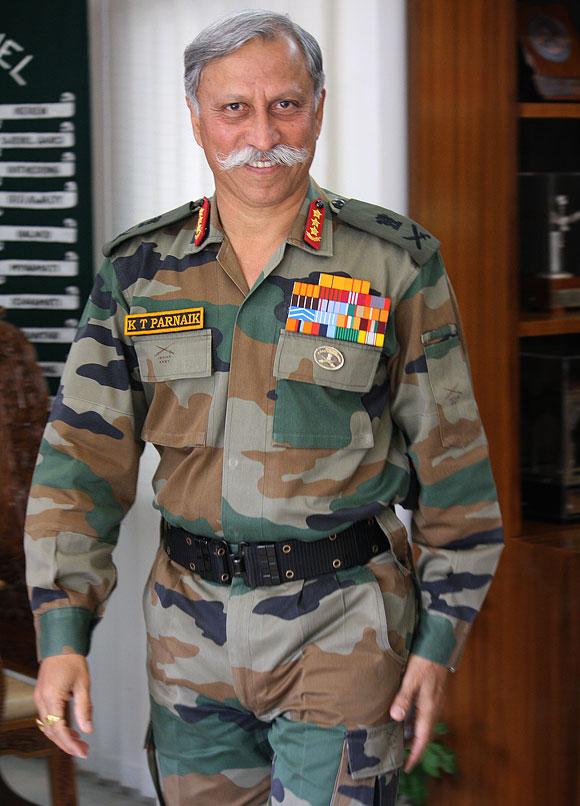
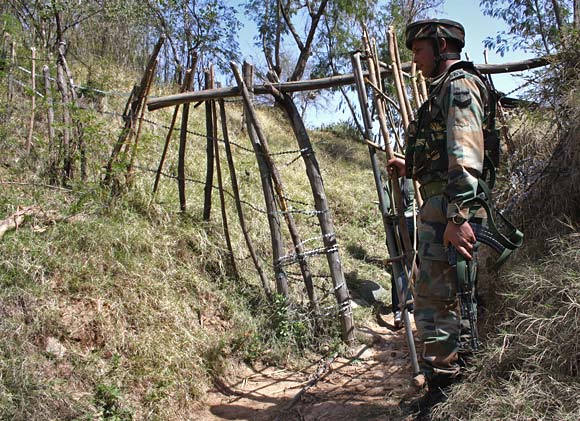
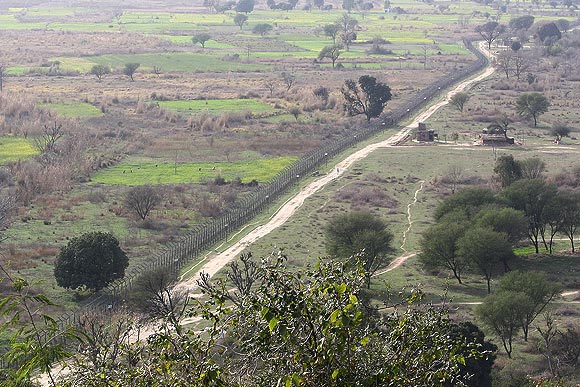
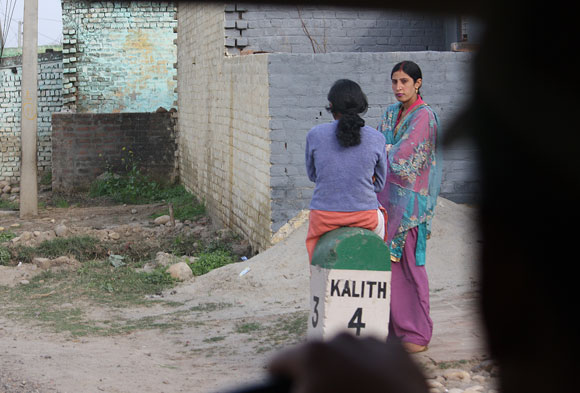
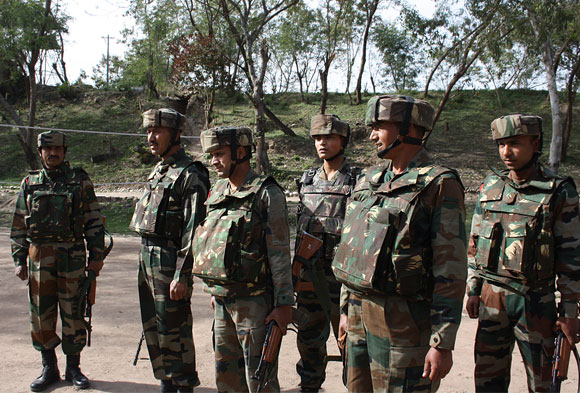
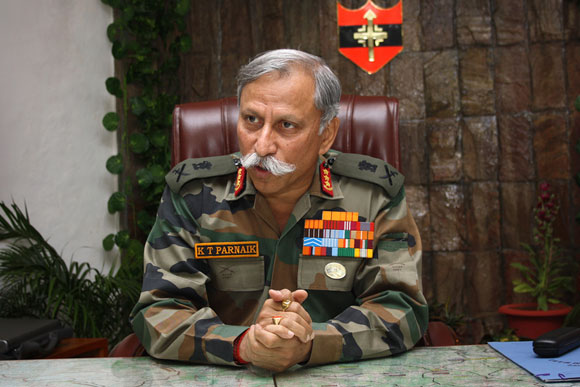
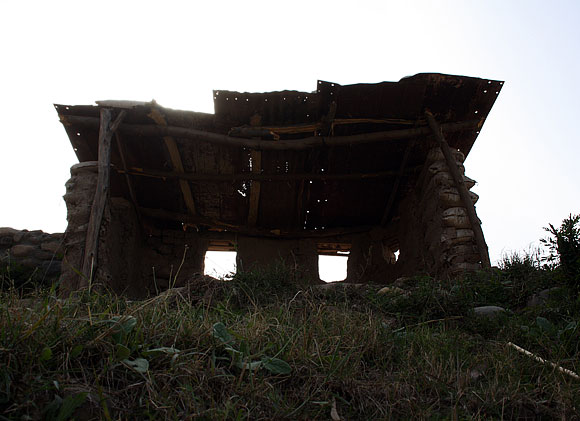
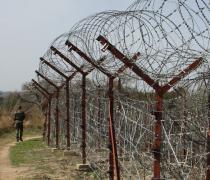
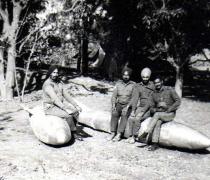
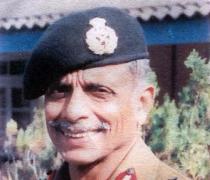
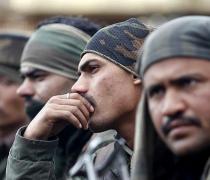
More from rediff